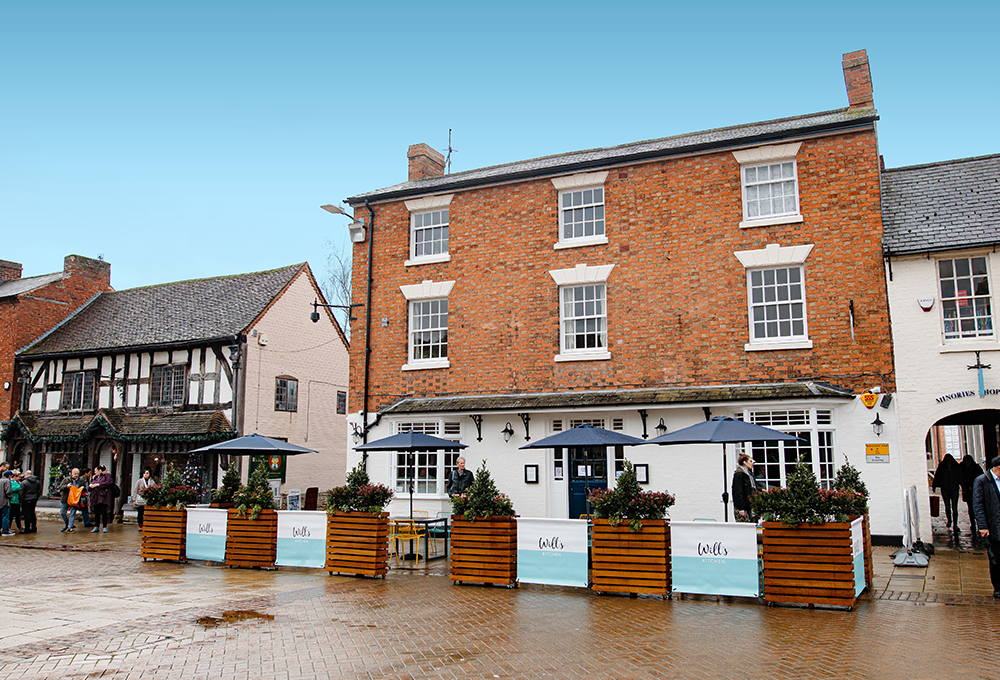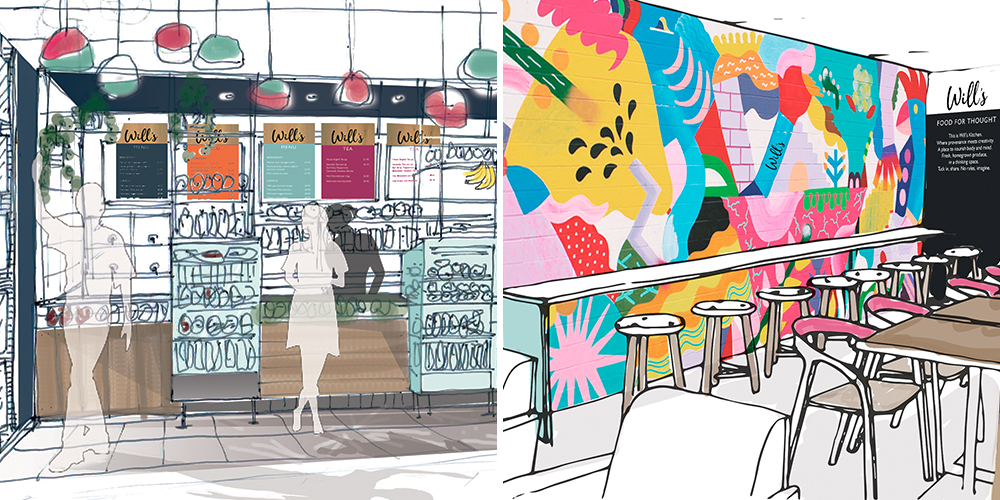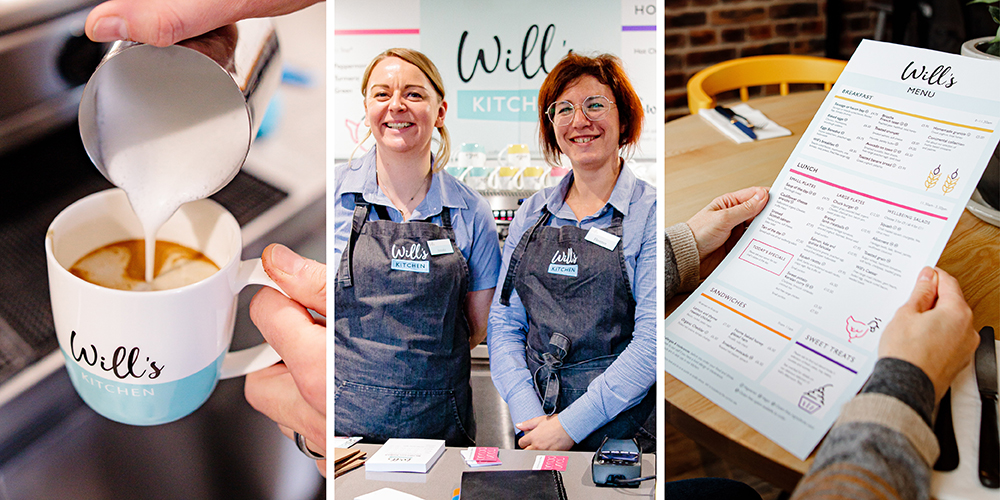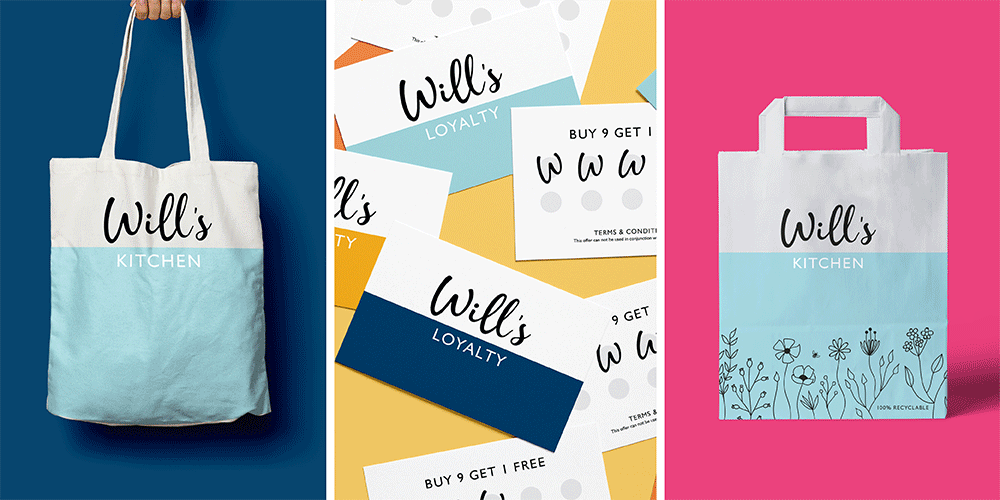Creative Insights: Will’s Kitchen

Copywriter Chloe Marshall interviews Creative Director Nicola Edginton, Art Director David Souch, Account Director Zoë March and Senior Account Manager Hannah Bridgeman about a truly holistic brand consultancy project for Shakespeare Birthplace Trust.
Q. Tell me a bit about the background of the project?
The Shakespeare Birthplace Trust is a long standing mark-making* client. It’s the independent charity that cares for Shakespeare’s five family homes in Stratford-upon-Avon and promotes the enjoyment and understanding of his works, life and times all over the world.
In 2019, the Trust opened a new café on Henley Street. A venue with a difference that stands out in a crowded market, appeals to both visitors and locals and widens the visitor experience beyond Shakespeare’s family homes.
Our part in that journey began about two years ago, when we were tasked with developing a brand identity for the new café. The ongoing brand consultancy project has been a brilliant experience for the whole team here.
Q. What informed our approach?
Over the last few years, the Trust has established really good practice and credentials for its food and drink offer. The café teams source organic ingredients, use as much produce as they can from the Trust’s own living Tudor farm, and work with sustainable, local suppliers wherever possible. They’ve even been recognised for it with a Soil Association accreditation.
We recognised that it was important to keep championing this area of the Trust’s offer. But, with this step into a space focused purely on hospitality, the stakes were higher. Organic, sustainable ingredients and practices were just the beginning.
The Shakespeare Birthplace Trust exists to preserve and progress Shakespeare’s legacy in a fresh, contemporary, and exciting way, that’s accessible and relevant to all.
This café presented a huge opportunity, and probably a unique one in the lifetime of the organisation. A chance to bring the Trust’s purpose to life and connect with wider audiences in a completely new way, beyond the bounds of its historical role as a cultural heritage attraction.
Q. How did you bring the Trust’s purpose to life in this new hospitality context?
Shakespeare’s Birthplace and the Shakespeare Centre, home of the Trust and its collections, sit on the north side of Henley Street. The location for the new café is directly opposite.
These two sites reflect the passion and reverence for Shakespeare’s creative and local legacy on one side, and the potential it has to inspire a wider audience of future generations on the other.
The vision, inspired by Shakespeare’s influence and legacy, is to encourage Shakespeare’s way of thinking. It invites customers to explore and engage with creativity, whatever that looks like for them, however interested – or not – they might be in Shakespeare’s life and work. An environment designed to inspire playfulness and observation. A space that excites imaginations, as well as appetites.
Q. What details about this project did you love?
This was a chance to create a venue where a different kind of relationship between the Trust and Stratford-upon-Avon residents could flourish. A place local people could feel real ownership over – perhaps one that might even become a preferred destination, like other highly valued independents in the area.
There are so many ways, great and small, in which an experience comes to life for customers: the name, the interiors, the identity, how the space is used – and of course, the food. The Trust also planned to commission art for the space. The first piece, Creative Ecology, would inspire people to think about the landscape, culture and ecology surrounding of Shakespeare’s hometown.
Thinking holistically was vital if this café was going to compete with national chains and local favourites. We worked closely with interior designer Emily Pearman, who expertly translated our vision into a set of practical and aesthetic considerations for the environment. How the space would be used; how many covers it could comfortably handle while retaining the bustling-yet-relaxed atmosphere we wanted to create; the different ways people might experience the space; where there might be room for creative expression and interaction.
We considered the experience as a whole to help the team at the Trust shape it in a consistent way. As other specialists got involved to deliver different aspects of the project, that one vision helped us all pull in the same direction.

Q. Tell me a bit more about the project?
Beyond our brand consultancy role throughout the journey from idea to opening, we created the brand’s identity.
The Trust’s chosen name, Will’s Kitchen, felt like the perfect, grounded complement to the Trust’s more elevated discourse around Shakespeare as the world’s greatest storyteller. It brings home his humanity with a reminder that Shakespeare was, as well as a creative genius, also a jobbing actor who spent time in pubs – a local boy who made good.
Designer Ben Wright once said “The logo should be the full stop at the end of a beautiful story”. This one needed to acknowledge the story so far, and start a whole new one.
It also needed to feel welcoming. To lift away the layers of prestige that might usually be associated with the Trust, and make the brand feel inclusive.
 The handwritten script of “Will’s” is the key connection to Shakespeare’s legacy and the history all around the site. The flood of colour or pattern acts like a blank canvas (because Will’s Kitchen is a space where everyone can express themselves) but the sense of identity and ownership is always there. It gives us an opportunity to engage people differently, playfully, through the designs.
The handwritten script of “Will’s” is the key connection to Shakespeare’s legacy and the history all around the site. The flood of colour or pattern acts like a blank canvas (because Will’s Kitchen is a space where everyone can express themselves) but the sense of identity and ownership is always there. It gives us an opportunity to engage people differently, playfully, through the designs.
The combination of the name and the logo design creates a really versatile asset: it’s possible to change that one word – simply for useful functional variation, or to convey a whole different feeling entirely.
The colours were intentionally light, a counterpoint to the rich reds of the Trust’s existing identity. The iconography provided a visual language, useful in many areas, especially for communicating that underlying message around the environment and sustainable produce.
 Q. What was the biggest challenge?
Q. What was the biggest challenge?
It’s been quite an adventure for us and the SBT team. To deliver a new offer in a new sector is always going to be challenging, and there were a lot of stakeholders to carry along on the journey. We’ve taken collaboration to a whole new level with this project, and it’s been worth it.
Q. What was the most enjoyable aspect of this project?
Nic: This project presented a unique opportunity to realise the Trust’s purpose in a completely new way. To bring to life their personality outside the restrictions of being a cultural attraction, to be a destination that is accessible to a wide selection of people. It was a challenge the team and I relished.
David: My favourite moments were times when we’d hear the project team speaking in the language of our proposed vision and direction. They made it their own, and that’s when you know you’ve really hit the nail on the head.
mark-making* have been instrumental in helping to develop, shape and deliver the vision of Will’s Kitchen for all to enjoy. The new cafe provides the Trust with a unique platform to celebrate Shakespeare’s creativity and his enduring influence. mark-making*s holistic approach to the brief was spot on, showing us how we could link the past with the future to create unique dining experiences for local people and visitors alike. Having that future vision has allowed us to move the Trust forward to have an inspiring venue in a highly competitive market, whilst retaining our roots through Shakespeare’s legendary work.
– David Wright, Head of Marketing, Shakespeare Birthplace Trust
About markmaking*
markmaking*